Related Research Articles
August David Krohn (1803–1891) was a Saint Petersburg born zoologist of German origin. He was the son of Abraham Krohn, the founder of Russia's first brewery, who had left the island of Rügen to serve in the court of Catherine the Great. He was the uncle of the fennoman folklorist Julius Krohn. According to legend, Krohn is said to have left for Central Europe after losing to his younger brother Leopold the competition for the hand of a Vyborg mansion owner's 15-year-old daughter. He remained unmarried until his death at the age of 88.
Monika Schäfer-Korting is a German Pharmacologist and Toxicologist.
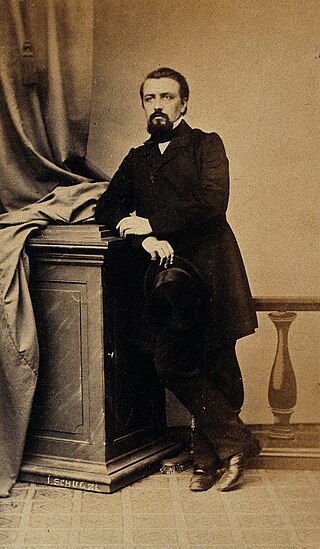
Nikolaus Friedreich was a German pathologist and neurologist, and a third generation physician in the Friedreich family. His father was psychiatrist Johann Baptist Friedreich (1796–1862), and his grandfather was pathologist Nicolaus Anton Friedreich (1761–1836), who is remembered for his early description of idiopathic facial paralysis, which would later be known as Bell's palsy.

Gabriel Gustav Valentin, also Gabriel Valentin, was a German physiologist and professor of physiology at the University of Bern.
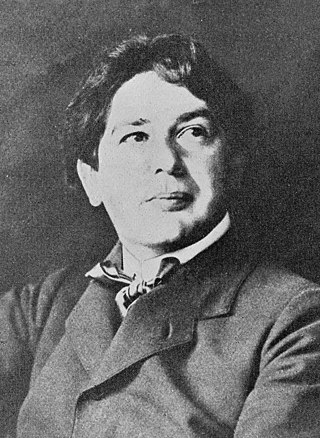
Alfred Fröhlich was an Austrian-American pharmacologist and neurologist born in Vienna.

Oxicam is a class of non-steroidal anti-inflammatory drugs (NSAIDs), meaning that they have anti-inflammatory, analgesic, and antipyretic therapeutic effects. Oxicams bind closely to plasma proteins. Most oxicams are unselective inhibitors of the cyclooxygenase (COX) enzymes. The exception is meloxicam with a slight (10:1) preference for COX-2, which, however, is only clinically relevant at low doses.
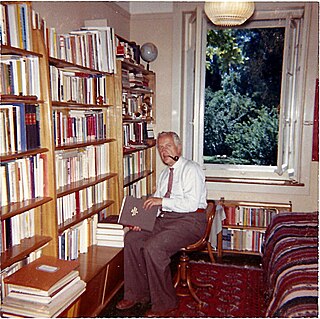
Hans Martin Sutermeister was a Swiss physician and medical writer, politician, and activist against miscarriages of justice.

Ulrich Förstermann is a German physician and pharmacologist.

Hans Horst Meyer was a German pharmacologist. He studied medicine and did research in pharmacology. The Meyer-Overton hypothesis on the mode of action on general anaesthetics is partially named after him. He also discovered the importance of glucuronic acid as a reaction partner for drugs, and the mode of action of tetanus toxin on the body.
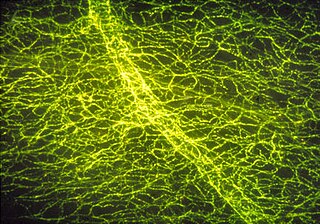
The catecholamines comprise the endogenous substances dopamine, noradrenaline (norepinephrine), and adrenaline (epinephrine), as well as numerous artificially synthesized compounds such as isoprenaline, an anti-bradycardiac medication. Their investigation comprises a major chapter in the history of physiology, biochemistry, and pharmacology. Adrenaline was the first hormone extracted from an endocrine gland and obtained in pure form, before the word hormone was coined. Adrenaline was also the first hormone whose structure and biosynthesis were discovered. Second to acetylcholine, adrenaline and noradrenaline were some of the first neurotransmitters discovered, and the first intercellular biochemical signals to be found in intracellular vesicles. The β-adrenoceptor was the first G protein-coupled receptor whose gene was cloned.
The Federation of European Pharmacological Societies (EPHAR) is a non-profit voluntary association established to advance research and education in the science of pharmacology and to promote co-operation between national/regional pharmacological societies in Europe and surrounding countries. It is an umbrella organization of currently 27 national societies for pharmacology and represents over 10,000 individual pharmacologists in Europe. Moreover it seeks to co-operate with other international organizations, especially the International Union of Basic and Clinical Pharmacology (IUPHAR) of which EPHAR is an associate member.
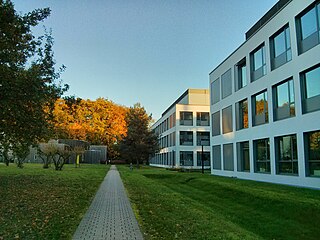
The Leibniz-Forschungsinstitut für Molekulare Pharmakologie (FMP) is a research institute in the Leibniz Association, focussing on proteins as basic structures of cellular organisms. It is one of the large number of research institutions based in Berlin. The institute is situated on a research campus in Buch, a northern district of Berlin. Legally, the FMP and seven other Leibniz Institutes based in Berlin are represented by the Forschungsverbund Berlin .

Friedrich Jung was a German doctor who became a leading Academic and Research Pharmacologist in the German Democratic Republic.
Paul Trendelenburg was a German pharmacologist.

Michael Joseph Rossbach was a German clinician and pharmacologist.
Olga Vassilievna Leonova, later Leonowa-von Lange born 1851 or 1859 was a physician and embryologist known for her studies of neuroembryology and congenital disorders, specifically those affecting the brain, spinal cord, eyes and limbs. Leonova was one of the first female scholars to work in Constantin von Monakow's laboratory ("Labörli"), founded in 1885, the origin the Zürch Brain Research Institute Brain Research Institute of Zurich University. Leonova, born in Russia, studied medicine in Moscow, St. Petersburg, Vienna and Leipzig. Later she did research work at the Imperial University of Moscow's cutting-edge neurobiology laboratories. Her research focussed on stillborn infants with congenital brain disease. Here she described the connection between central nervous system damage and congenital eye disease. She earned her doctoral degree before 1904, published at least 12 scientific papers between 1890 and 1909 but did not show further scientific development (Refs.). After a head start into the European neuroscience scene in 1894 as the only lady scientist presenting at the 66. central conference of German speaking naturalists and physicians in Vienna, she later apparently lost the support of the science community. This may partly be due to her argumentative, almost belligerent style of writing. Her work was cited for a short period and the forgotten. She eventually resided in a villa in Laufenburg, Germany, at the border to Switzerland, and became arrested in 1914 as a Russian spy. After two years she was allowed to move to Zürich.
Albrecht Julius Theodor Bethe was a German physiologist. He was the father of physicist Hans Bethe (1906–2005).
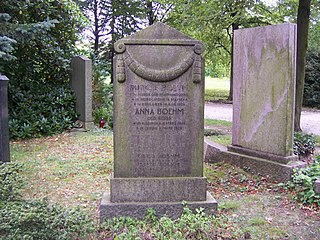
Rudolf Albert Martin Boehm (Böhm) was a German pharmacologist, known for his work in the field of experimental pharmacology.
Otto Hermann Krayer was a German-American physician, pharmacologist and university professor.

Peter Oehme is a German physician and pharmacologist. In 1977 he founded the East German Drugs Research Institute, serving as its director from January 1977 till December 1991 when the institute was reconfigured in the context of German reunification.
References
- ↑ Voices from the Past, Part 4 Archived September 12, 2011, at the Wayback Machine , Citizens for Safe Water (Pinellas County), 1 April 2007, retrieved 16 April 2010.
- ↑ C.W. Hess, "50 Jahre Schweizerische Gesellschaft für Klinische Neurophysiologie" Archived July 7, 2011, at the Wayback Machine , Schweizer Archiv für Neurologie und Psychiatrie 149, June 1998 (pdf, German).
- ↑ Hans Martin Sutermeister, Summa Iniuria: Ein Pitaval der Justizirrtümer: fünfhundert Fälle menschlichen Versagens im Bereich der Rechtsprechung in kriminal- und sozialpsychologischer Sicht. Basel: Elfenau, 1976, pp. 40–43: [Als Gordonoff daraufhin] Prof. Naville offen "Unfähigkeit" vorwarf, stotterten Staatsanwalt Cornu und Gerichtspräsident Cougnard . . . etwas von "unvermeidlichen Irrtümern". [Daraufhin legte man] "Popescu ein Begnadigungsgesuch nahe".